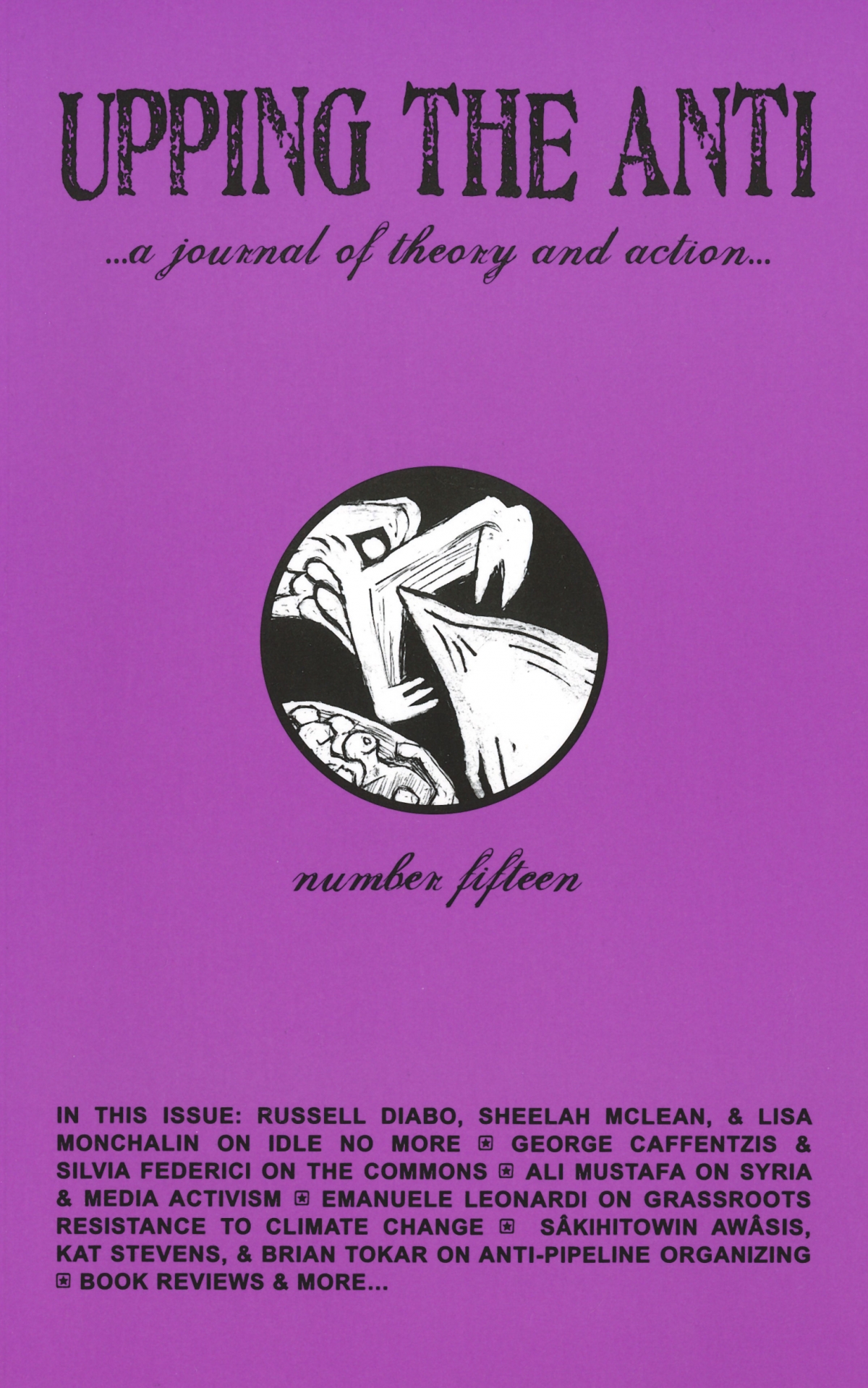Introduction
September 2013. Here at Upping the Anti, we have been going through a great deal of change. As some editorial members have children, some get jobs in Nepal, or some move on to graduate school, we find ourselves struggling with the workload. We struggle to do what needs to be done without enough people. It certainly seems as though our situation mirrors (albeit on a smaller scale) the general condition of the Left. As Syrians and Egyptians continue to struggle against authoritarian regimes, as Palestinians continue to live in an apartheid state, as Idle No More’s Solidarity Summer comes to an end, as organizing persists against Line 9 pipeline reversal in central Canada, and as California prisoners conclude their historic two-month long hunger strike, we’ve been thinking about the necessity to expand and strengthen our movements. W hat opportunities are there for us to create unity despite difference? The strength of these moments lies in the potential for their intersections to open up solidarity across divergent spaces, identities, and struggles. This is a theme we see running through much of the content in Issue 15.
In our editorial, we engage with the notion of reflective solidarity contextualized within local feminist movements today, and the necessity of renewing a call for feminist revolution. We reaffirm the calls of numerous feminists to build a broader network of resistance against gendered exploitation by forging alliances across struggles that are not perceived as explicitly feminist.
Our first interview of the issue is with freelance journalist Ali Mustafa on his recent visit to Syria and the political complexities involved with situating the Left in the Syrian civil war. The next is a set of three interviews, conducted by Toban Black, with campaigners in Ontario, Vermont, and Texas, each of whom articulates a different angle on the breadth and strength of anti-pipeline organizing today.
Both articles in this issue address the radical possibilities presented by political action centred on the commons. In our first article, George Caffentzis and Silvia Federici explore the features of a specifically revolutionary politics of the commons, distinct from its co-opted reactionary usages and its market formulations. In our second article, Emanuele Leonardi reports on grassroots mobilizations at the 2011 United Nations climate negotiations in Durban, South Africa; he argues that activists should be mobilizing a “politics of the climate as an atmospheric common/s.”
In the centre of the issue we come to a roundtable discussion with Russ Diabo, Sheelah McLean, and Lisa Monchalin about the historical roots and the possible futures of Idle No More. Finally, we have three great book reviews: Rebecca Tumposky reflects on the practicalities of feminist and anti-racist organizing in Chris Crass’ T owards Collective Liberation: Anti-Racist Organizing, F eminist Praxis, and Movement Building S trategy; Theresa Warburton explores storytelling and alternative peoples’ histories by connecting Adela C. Licona’s Zines in Third Space: Radical Cooperation and Borderlands Rhetoric and Emma Pérez’s Forgetting the Alamo, or, Blood M emory; and Greg Shupak engages with electronic technology as a site of resistance through @ is for Activism by Joss Hands.
As usual, since Issue 14 we have seen the make-up of the Editorial Committee and Advisory Board shift and change. Two highly skilled and solid editors joined our Editorial Committee: Cara Fabre and Matthew Hayter. Meanwhile, the Editorial Committee has said goodbye to three other members: Ali Mustafa joined us briefly in the winter, but has since left to pursue his journalistic work in Egypt and Syria; we wish Simon Wallace luck with his work in law school; and Adrie Naylor has stepped back after several years, but remains involved as a new member of our Advisory Board. The newest member-in-waiting of the Editorial Committee, Olive Josephine Thorbrook was born to editor Élise Thorburn in the midst of Issue 15. On our Advisory Board we said goodbye and congrats to Robert Nichols, who accepted a job in Europe early this year. We also said goodbye to Robyn Maynard and Ander Reszczynski-Negrazis after many years of support.
As the editorial committee has worked hard to get this issue out, we thank the many volunteers who stepped up to help with copy-editing. A tip of the hat to Geordie Dent, Amanda Dorter, Frankie Filippelli, Anabel Khoo, Lindsay Hart, Megan Hope, Nora Loreto, Martin Lukacs, Manuel Bonilla-Marqués, Tyler McCreary and Jessica Peart.
We hope you find this issue useful in your organizing and research, and we look forward to your letters, submissions, and continued support. Our commitment to independence means that we are entirely reliant on subscribers, sustainers, and donors. We urge you to subscribe (and encourage others too!) or sign up to make a monthly donation as a sustainer. We wouldn’t be here without your continued support.
If you are interested in contributing to Issue 16, please send a pitch to uppingtheanti@gmail.com describing your proposed contribution by November 1, 2013. For more information, please visit uppingtheanti.org.
For a revolutionary tomorrow,
Irina Ceric, Cara Fabre, Matthew H ayter, Sharmeen Khan, Robyn Letson, and Élise Thorburn

